Research News
- Minister of Education-AP applauds the Research Focus of SRMAP November 27, 2020
SRM University-AP has been honoured with the gracious presence of the Hon’ble Minister of Education Dr Adimulapu Suresh on November 17, 2020, when he came to inaugurate the sub Post Office at the SRM University-AP, Andhra Pradesh Campus. He visited the campus and, witnessed its infrastructure, and discussed the future plans and goals of SRMAP with Prof V S Rao, Vice-Chancellor. In his welcome address, Prof V S Rao, Vice-Chancellor expressed his gratitude to the Minister for finding some time to visit SRMAP. With a well-documented presentation, he narrated how SRMAP has embarked upon the vessel of excellence and innovation within a meagre span of just two years. The three-year-old university has already published almost 300 papers in reputed journals, has 27 projects with an outlay of 14 crores and 17 patents.
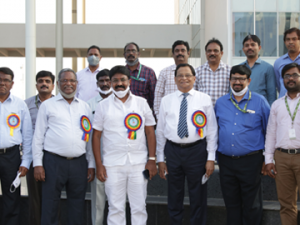 Minister of Education with SRM FacultyIn his message, the august guest of the day, Dr Suresh expressed his joy to see a university achieving such great heights within two years in the realms of research and education. While presenting the offer letters to the placed students, he was enraptured to see that SRMAP provides such quality education that not only students from engineering, but also the students from other general degree courses were able to bag desired packages from reputed companies like Deloitte etc. According to Dr Suresh, Hon’ble Minister, the greatest predicament of the country is not unemployment but unemployability as most educational institutions fail to deliver a proper and complete education that can satisfy the demands of the present world and make the students job-ready. He was delighted to know that SRMAP, since its inception, always strived to make curriculums industry-oriented, put particular emphasis on the placement training to make students interview-ready, encouraged the students for research since their undergraduate studies, helped them to grow and know the world with the Semester Abroad Programme. Among the maiden batch of SRM University-AP, 40% of students have bagged job offers with packages of 10 lakhs per annum or higher, with the highest offered salary of 29.5 lakhs per annum. The Minister of Education was greatly satisfied with SRM University’s vision and progress so far and wished for further marvels to be created.
Minister of Education with SRM FacultyIn his message, the august guest of the day, Dr Suresh expressed his joy to see a university achieving such great heights within two years in the realms of research and education. While presenting the offer letters to the placed students, he was enraptured to see that SRMAP provides such quality education that not only students from engineering, but also the students from other general degree courses were able to bag desired packages from reputed companies like Deloitte etc. According to Dr Suresh, Hon’ble Minister, the greatest predicament of the country is not unemployment but unemployability as most educational institutions fail to deliver a proper and complete education that can satisfy the demands of the present world and make the students job-ready. He was delighted to know that SRMAP, since its inception, always strived to make curriculums industry-oriented, put particular emphasis on the placement training to make students interview-ready, encouraged the students for research since their undergraduate studies, helped them to grow and know the world with the Semester Abroad Programme. Among the maiden batch of SRM University-AP, 40% of students have bagged job offers with packages of 10 lakhs per annum or higher, with the highest offered salary of 29.5 lakhs per annum. The Minister of Education was greatly satisfied with SRM University’s vision and progress so far and wished for further marvels to be created.
Continue reading →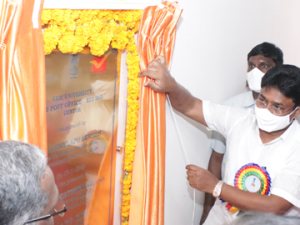 Dr Suresh inaugurating the sub post-officeThe Minister later met with the DEANS and HODs and the reputed Ramalingaswami Fellow, DST-Inspire Fellow and faculty members who are rigorously working on several projects. The Minister was pleased to see the focus on research. He said, “The Govt of Andhra Pradesh is against of commercialization of education, but we are not against private educational institutes. It is very encouraging to see how SRM University, following the footsteps of the government, has embedded complete and inclusive education that supports equity, equality, and affordability. Industry-Academia interaction is a weak point in our pedagogical system, but it is good to see that SRM University is moulding students in a proper way to make them market-ready. The advancement of the Education sector is the dream of our Chief Minister, and many pedagogical and educational reforms are being done in order to the standardization of the Education Sector. The Management of SRM University-AP has opted for a student-centric education that follows the mandates of National Education Policy-2020.”
Dr Suresh inaugurating the sub post-officeThe Minister later met with the DEANS and HODs and the reputed Ramalingaswami Fellow, DST-Inspire Fellow and faculty members who are rigorously working on several projects. The Minister was pleased to see the focus on research. He said, “The Govt of Andhra Pradesh is against of commercialization of education, but we are not against private educational institutes. It is very encouraging to see how SRM University, following the footsteps of the government, has embedded complete and inclusive education that supports equity, equality, and affordability. Industry-Academia interaction is a weak point in our pedagogical system, but it is good to see that SRM University is moulding students in a proper way to make them market-ready. The advancement of the Education sector is the dream of our Chief Minister, and many pedagogical and educational reforms are being done in order to the standardization of the Education Sector. The Management of SRM University-AP has opted for a student-centric education that follows the mandates of National Education Policy-2020.” - SRMAP faculty recognised by Stanford University among the top Biotechnologists November 24, 2020
Dr Imran Pancha from the Department of Biological Sciences, SRM university – AP is recognised in Biotechnology among the top 2% scientists/researchers across the world By Stanford University Researchers. Recently an article has been published in PLOS Biology by Stanford University Researchers on the highly cited researchers in 22 different fields and their subfields. In the Biotechnology field, 1,074 scientists/faculty members were identified, and Dr Imran Pancha is one amongst them. From India, only 77 scientists/faculty members could achieve this honour, and Dr Imran Pancha is one among them. This is an admirable achievement for a young faculty from a nascent University to be in the top 2% scientists of the world. Dr P Sathyanarayanan, the President of SRM University-AP honoured Dr Pancha for bringing this scientific laurel to the university.
Overall, of the top 160,000 scientists from different fields of Science & Technology, India hosts 2,313 scientists/faculty members. This list comprises of the prominent and illustrious scientists from India.
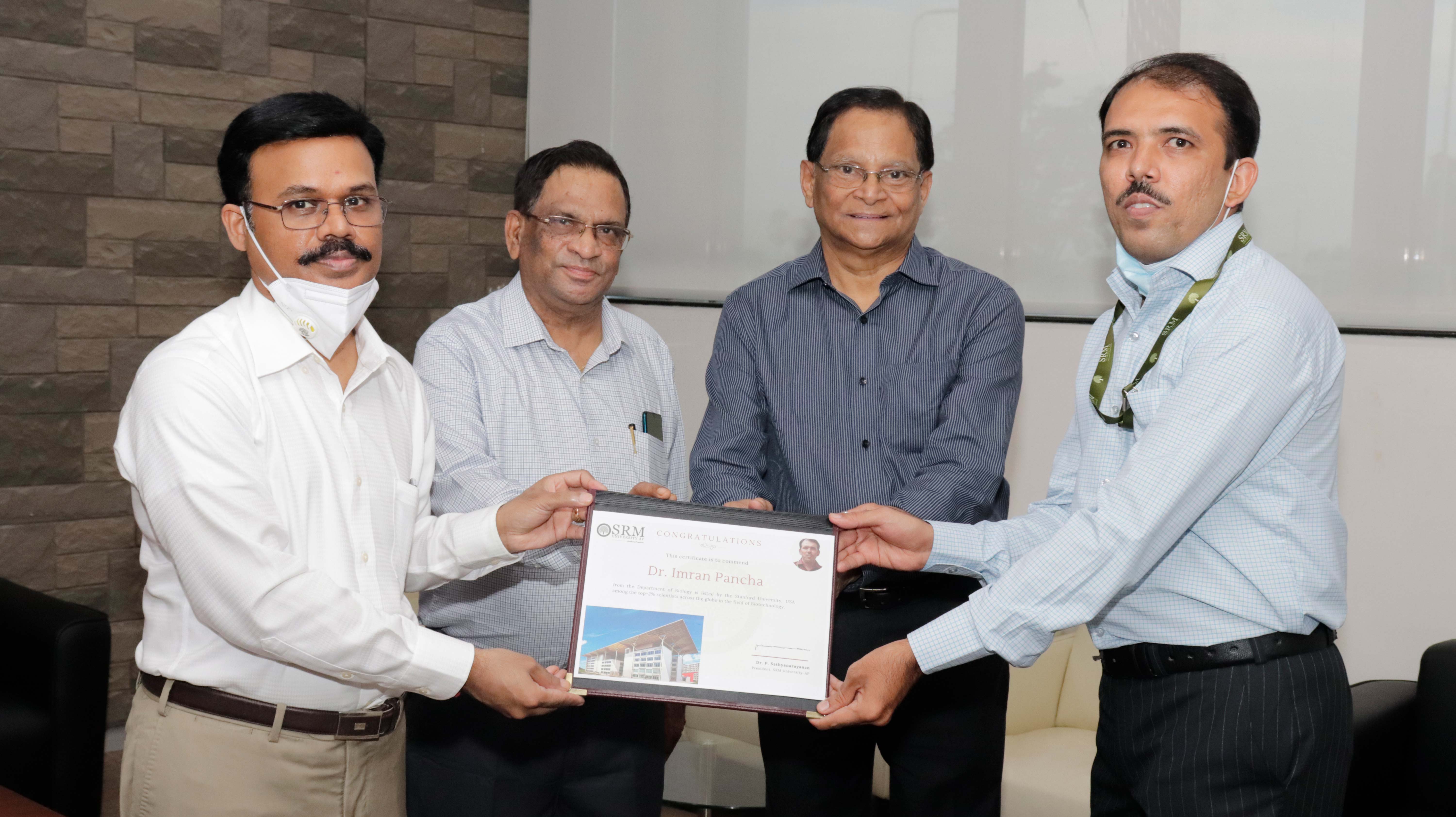
Dr Imran Pancha is a young researcher working as an Assistant Professor in the Department of Biological Sciences in SRM University-AP, Andhra Pradesh. He has obtained his doctoral degree from CSIR-Central Salt and Marine Chemicals Research Institute-Bhavnagar after graduating from Bhavnagar University. He has also worked as a post-doctoral fellow at Japanese Society for Promotion of Science, Japan before joining SRM University-AP.
Dr Pancha’s primary research focus is to produce renewable energy from microalgae. His team is trying to develop integrated microalgal bio-refinery to produce high-value compounds like phycobiliproteins, carotenoids along with biofuel and bio-fertilisers from microalgae. Apart from this, he is also interested to understand algal-bacterial interaction, particularly isolate and characterise the microalgae associated bacteria and finding their role in growth enhancement and inhibition in microalgae.
Continue reading → - Dr Goutam Kumar Dalapati develops high-performance photodetectors with improved electrical parameters November 19, 2020
 Dr Goutam Kumar Dalapati, Associate Professor, Department of Physics, SRM University-AP, Andhra Pradesh, published a research paper “Improvement on Photoresponse Properties of Self-Powered ITO/InP Schottky Junction Photodetector by Interfacial ZnO Passivation” in the reputed Journal of Electronic Materials, Springer. Photodetection has emerged as the key technology in contemporary science because of their wide range of applications in daily life and in industry, including astronomy, surveillance, environmental monitoring, machine vision, and cameras in smart phones. Commercial photodiodes should meet the criteria of high charge carrier mobility, small exciton binding energy, and higher stability. This intrigued Dr Goutam to indulge in the study of photodetector which is essential to improve several electrical parameters such as low power consumption, and higher sensitivity.
Dr Goutam Kumar Dalapati, Associate Professor, Department of Physics, SRM University-AP, Andhra Pradesh, published a research paper “Improvement on Photoresponse Properties of Self-Powered ITO/InP Schottky Junction Photodetector by Interfacial ZnO Passivation” in the reputed Journal of Electronic Materials, Springer. Photodetection has emerged as the key technology in contemporary science because of their wide range of applications in daily life and in industry, including astronomy, surveillance, environmental monitoring, machine vision, and cameras in smart phones. Commercial photodiodes should meet the criteria of high charge carrier mobility, small exciton binding energy, and higher stability. This intrigued Dr Goutam to indulge in the study of photodetector which is essential to improve several electrical parameters such as low power consumption, and higher sensitivity. In this research, Dr Goutam developed a high-performance photodetector using Indium phosphide/indium tin oxide (InP/ITO) semiconductor metal junction. He explains, “Photodetection in semiconductors follows the principle of generating electron-hole pairs under incident light higher than or equal to its bandgap. In Schottky type photodiode, at thermal equilibrium, the Fermi levels of the metal and the semiconductor are equalized, and a transfer of electronic charge occurs from the semiconductor to the metal. Moreover, these charge transport properties can be simply tailored by compositional engineering, which provides plenty of space to modulate the performance metrics of the photodetectors. During my research, the atomic layer deposition of zinc oxide (ZnO) on the InP surface was found to increase the valence band offset for current conduction in the photodiode. Photoresponse properties were believed to improve through effective hole blocking by the ZnO interface layer which further prevents the surface recombination of photo-induced generated electron-hole pair. Through my research, I deciphered that the ITO/ZnO/InP photodiode exhibited a maximum photoresponsivity of 44.2 mAW−1 under a 520 nm laser irradiation with an illumination power of 1 μW at the zero bias voltage.”
In this research, Dr Goutam developed a high-performance photodetector using Indium phosphide/indium tin oxide (InP/ITO) semiconductor metal junction. He explains, “Photodetection in semiconductors follows the principle of generating electron-hole pairs under incident light higher than or equal to its bandgap. In Schottky type photodiode, at thermal equilibrium, the Fermi levels of the metal and the semiconductor are equalized, and a transfer of electronic charge occurs from the semiconductor to the metal. Moreover, these charge transport properties can be simply tailored by compositional engineering, which provides plenty of space to modulate the performance metrics of the photodetectors. During my research, the atomic layer deposition of zinc oxide (ZnO) on the InP surface was found to increase the valence band offset for current conduction in the photodiode. Photoresponse properties were believed to improve through effective hole blocking by the ZnO interface layer which further prevents the surface recombination of photo-induced generated electron-hole pair. Through my research, I deciphered that the ITO/ZnO/InP photodiode exhibited a maximum photoresponsivity of 44.2 mAW−1 under a 520 nm laser irradiation with an illumination power of 1 μW at the zero bias voltage.”For the successful implementation of the proposed ITO/ZnO/InP photodiode in the manufacturing levels, significant efforts are essential. Dr Goutam acknowledges that device to device variability must be addressed which arise from the deposition condition of the ZnO layer by atomic layer deposition. Surface defects reduction and selection of charge collecting electrodes must be optimized to improve the performance of the photodetector. Thus, Dr Goutam will dedicate his future research work to study patterned 2D graphene-based electrode to improve the performance. Also, n-type 2D MoS2 and hexagonal boron nitride (hBN) passivation will be studied by him on the III-V semiconductor surface for better photoresponsivity.
Continue reading → - Dr Lakhveer Singh’s impactful research proposes remedial strategies for mitigating phthalate pollution November 18, 2020
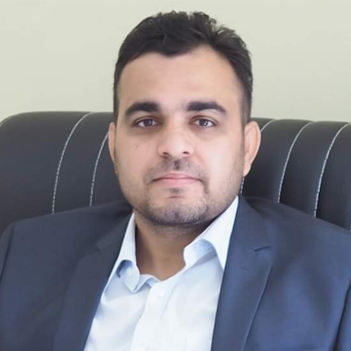 Dr Lakhveer Singh, Assistant Professor, Department of Environmental Science, SRM University-AP, Andhra Pradesh published an article titled “Remediation strategies for mitigation of phthalate pollution: Challenges and future perspectives” in the Journal of Hazardous Materials, with an Impact Factor of 9.03. In recent times, there has been an escalating concern over the risk of phthalate exposure leading to adverse effects on human health and the environment. Dr Lakhveer acknowledged the necessity of understanding the current status of phthalate pollution, their sources, exposure routes, and health impacts, along with understanding the remediation technologies for mitigating such issues.
Dr Lakhveer Singh, Assistant Professor, Department of Environmental Science, SRM University-AP, Andhra Pradesh published an article titled “Remediation strategies for mitigation of phthalate pollution: Challenges and future perspectives” in the Journal of Hazardous Materials, with an Impact Factor of 9.03. In recent times, there has been an escalating concern over the risk of phthalate exposure leading to adverse effects on human health and the environment. Dr Lakhveer acknowledged the necessity of understanding the current status of phthalate pollution, their sources, exposure routes, and health impacts, along with understanding the remediation technologies for mitigating such issues.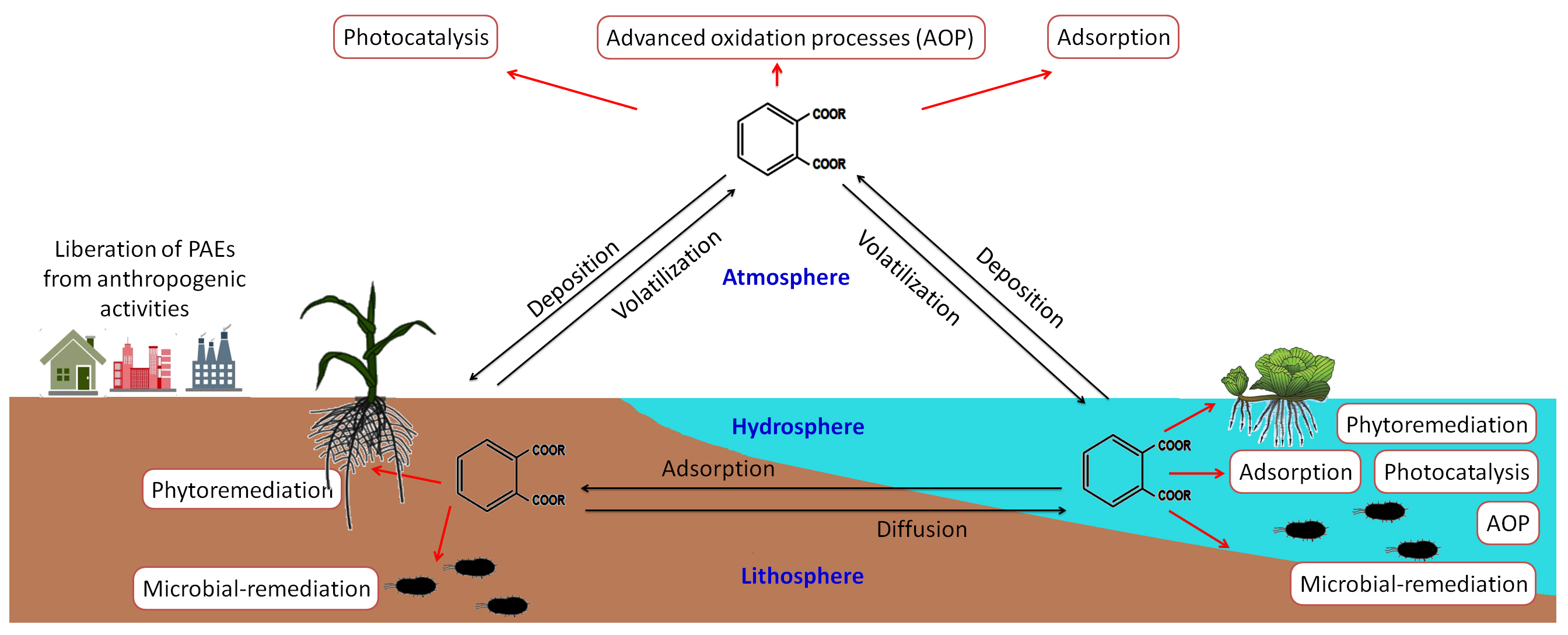 In this collaborative work between Indian Institute of Technology, Delhi, Jawaharlal Nehru University, and SRM AP, Dr Lakhveer enumerates the major phthalates in use today, shares insights on the ever-increasing data on health burdens posed by phthalates and simultaneously, highlights the recent advancements in research to alleviate phthalate contamination from the environment. Tracing their environmental fate, he addresses the growing health hazard concerns imposed by phthalates, along with focusing on understanding the different physical, chemical, and biological treatment of phthalates that are currently being used.
In this collaborative work between Indian Institute of Technology, Delhi, Jawaharlal Nehru University, and SRM AP, Dr Lakhveer enumerates the major phthalates in use today, shares insights on the ever-increasing data on health burdens posed by phthalates and simultaneously, highlights the recent advancements in research to alleviate phthalate contamination from the environment. Tracing their environmental fate, he addresses the growing health hazard concerns imposed by phthalates, along with focusing on understanding the different physical, chemical, and biological treatment of phthalates that are currently being used.Dr Lakhveer explains, “Depending on the degree and nature of contamination, PAEs can be eliminated from different environmental matrices via various available processes such as adsorption, coagulation-flocculation, microbial biodegradation, phytoremediation, photocatalysis, and advanced oxidation processes. However, the efficiency of all these processes depends on various factors including inherent Physico-chemical nature of phthalates, environmental factors, and technological sufficiency.” Thus, advancing his research work in the future, Dr Lakhveer will opt for a holistic approach to develop novel processes for the remediation.
Continue reading → - Dr Nimai Mishra analyzes approaches to stabilize photoluminescent nanocrystals November 12, 2020
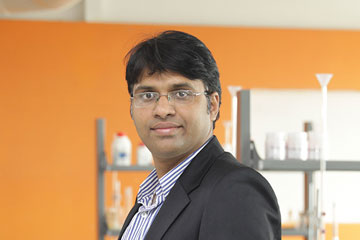 Dr Nimai Mishra, Assistant Professor, Department of Chemistry, SRM University-AP, Andhra Pradesh, along with his research group comprising of students pursuing PhD under him, Ms. V.G.Vasavi Dutt and Mr. Syed Akhil, have published a comprehensive mini review titled “Surface Passivation Strategies for Improving Photoluminescence and Stability of Cesium Lead Halide Perovskite Nanocrystals” in the Journal “ChemNanoMat” (Wiley-VCH) with an Impact Factor of 3.4.
Dr Nimai Mishra, Assistant Professor, Department of Chemistry, SRM University-AP, Andhra Pradesh, along with his research group comprising of students pursuing PhD under him, Ms. V.G.Vasavi Dutt and Mr. Syed Akhil, have published a comprehensive mini review titled “Surface Passivation Strategies for Improving Photoluminescence and Stability of Cesium Lead Halide Perovskite Nanocrystals” in the Journal “ChemNanoMat” (Wiley-VCH) with an Impact Factor of 3.4. 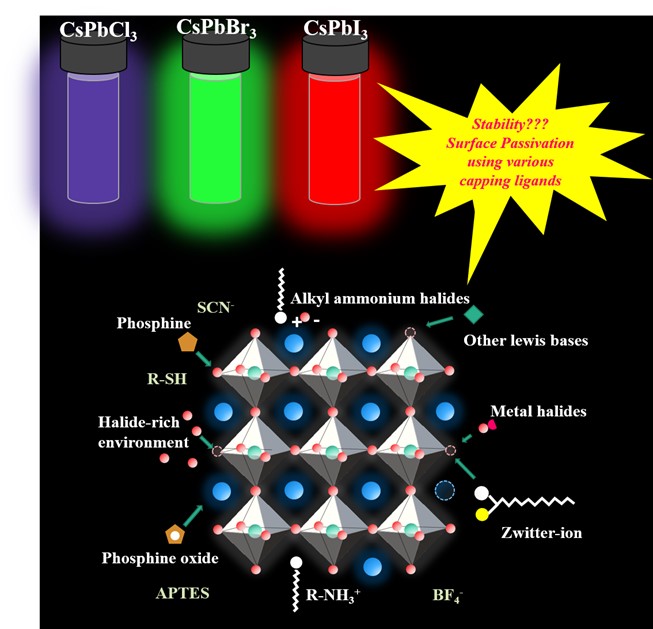 Cesium lead halide (CsPbX 3) perovskite nanocrystals (NCs) is emerging as an intriguing subject for the optoelectronics for its excellent optical properties and exceptional colour tunability. However, applicability of the materials become a major challenge due to their degenerative property. Consequently, researchers focus on developing various approaches to enhance the photoluminescence properties and stability of CsPbX 3 perovskite NCs. In the paper, Dr Mishras’s group reviews some of the promising approaches such as post‐synthetic modification, ligand exchange, and insitu addition.
Cesium lead halide (CsPbX 3) perovskite nanocrystals (NCs) is emerging as an intriguing subject for the optoelectronics for its excellent optical properties and exceptional colour tunability. However, applicability of the materials become a major challenge due to their degenerative property. Consequently, researchers focus on developing various approaches to enhance the photoluminescence properties and stability of CsPbX 3 perovskite NCs. In the paper, Dr Mishras’s group reviews some of the promising approaches such as post‐synthetic modification, ligand exchange, and insitu addition.Further, the strategies summarized in this paper will enable the production of high-quality nanocrystals having the potential to be used as active material in LED devices. In the future, Dr Mishra and his group plans on utilizing some of these surface passivation techniques to develop prototype LED devices using high quality nanocrystals.
Read the full paper: Please Click Here
Continue reading → - DST, Government of India grants a total outlay of Rs.27 lakhs to Dr Imran Y Pancha October 28, 2020
Utilizing photosynthetic microalgae to produce renewable biofuel
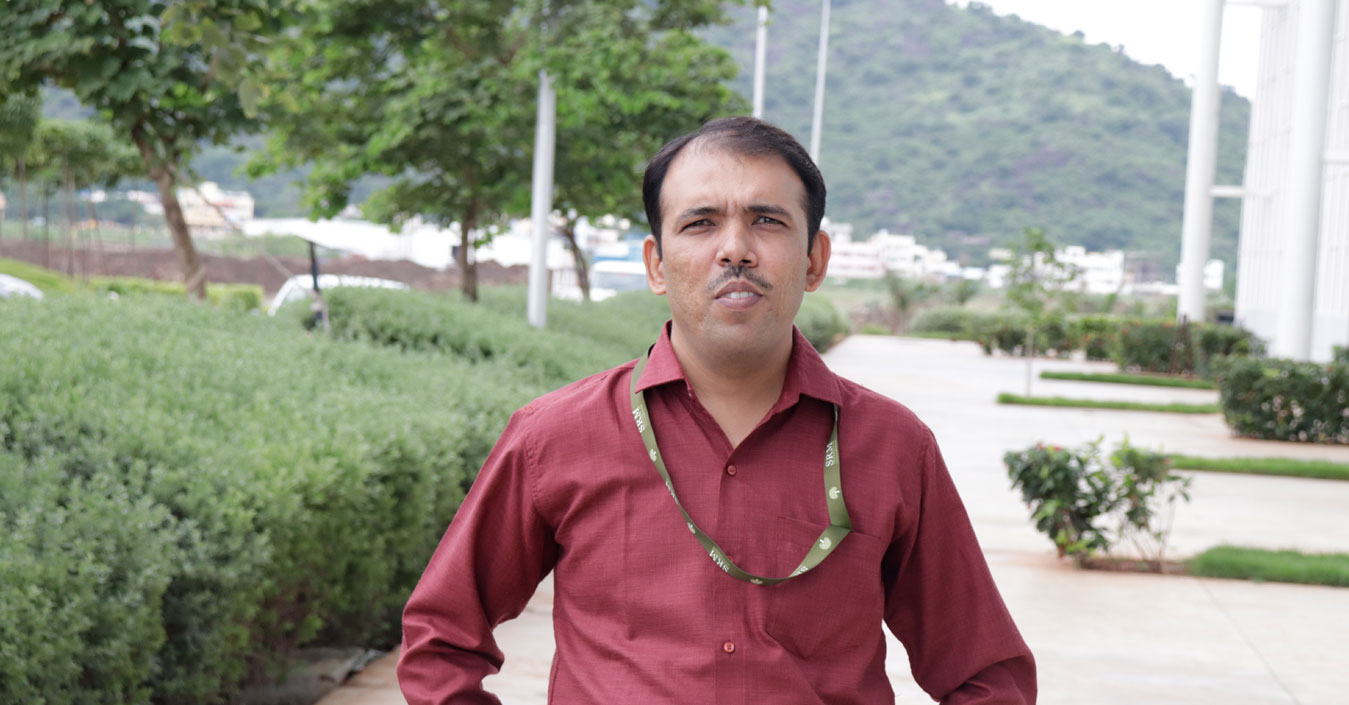 Dr Imran Y Pancha, Assistant Professor, Department of Biological Sciences, SRM University-AP, Andhra Pradesh has received an outstanding total outlay of Rs.27 lakhs from the DST, Government of India, to work on “Chemical modulator based microalgal biorefinery for the production of biofuels and bioproducts”. Dr Imran was fascinated by the potential of microalgae to reduce greenhouse gases (GHGs) as well as its ability to accumulate a high amount of energy reserved molecules such as lipids/starch in the cells. Through his research, Dr Imran will be understanding the mechanism behind this and also, exploit microalgae for biofuel production.
Dr Imran Y Pancha, Assistant Professor, Department of Biological Sciences, SRM University-AP, Andhra Pradesh has received an outstanding total outlay of Rs.27 lakhs from the DST, Government of India, to work on “Chemical modulator based microalgal biorefinery for the production of biofuels and bioproducts”. Dr Imran was fascinated by the potential of microalgae to reduce greenhouse gases (GHGs) as well as its ability to accumulate a high amount of energy reserved molecules such as lipids/starch in the cells. Through his research, Dr Imran will be understanding the mechanism behind this and also, exploit microalgae for biofuel production.Due to the development of industrialization and modernization, global energy demand is continuously increasing. Given that the fossil fuel energy reserve is limited, and its utilization causes various serious environmental issues such as global warming and the accumulation of GHGs in the atmosphere, renewable energy obtained from various biomass is a potential alternative to reduce atmospheric GHGs and the dependency on fossil-based fuel. Microalgae is one of the promising resources among various biomass since it has a high growth rate and photosynthetic ability in comparison to other terrestrial crop plants. Microalgae also accumulate a high amount of lipids and carbohydrates in the cell. Moreover, these microalgae can be cultivated in wastewater or seawater, which avoids the food versus fuel debate.
Dr Imran explains, “Microalgae usually accumulate lipid under stress conditions such as nitrogen starvation, which results in lower biomass production, limiting the commercialization of algal biofuel. The present research’s primary objective is to uncouple growth and lipid production pathway in the microalgae using chemical modulators. Utilization of such chemicals is also effortless in large scale production compared to the standard starvation approach. The next aim is to develop a process to extract multiple products such as pigments, lipids, and carbohydrates from single microalgal biomass. The development of such a biorefinery approach will lower the overall cost of the process and make it more economical on a large scale. To conclude, the focus of the project will be on utilizing photosynthetic microalgae to produce renewable biofuel and other commercially important products in a biorefinery manner. Utilization of microalgae will not only help to produce green fuel but also help in reducing atmospheric carbon dioxide (CO2) which creates several environmental issues.”
Using the SERB-SRG grant, microalgal cultivation facility will be established at SRM university-AP. The long-term goal of Dr Imran’s research group is to understand the molecular mechanism behind the accumulation of energy reserved molecules in the microalgae. Understanding such mechanisms will help to develop sustainable technology for the production of renewable biofuels from microalgae.
Continue reading → - DST, Government of India sanctions an outlay of Rs.14.63 lakhs to Dr Tapan Kumar Hota October 13, 2020
Connecting the dots between Mathematics and Physics of the hydrodynamic instability known as Viscous Fingering (VF)
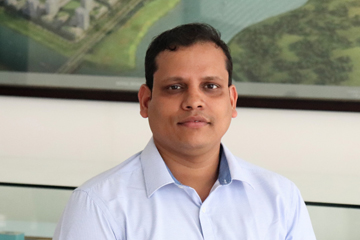
DST, Government of India, sanctioned a total outlay of Rs.14.63 lakhs to Dr Tapan Kumar Hota, Assistant Professor, Department of Mathematics, SRM University-AP, Andhra Pradesh, for pursuing research on “Mathematical analysis and Adjoint Based Stability for a Coupled Convection-Diffusion equation in Miscible Displacement”. Hydrodynamic Stability (Instability) is a study of an equilibrium point subject to small and/or medium disturbances. This assists in understanding several complicated natural phenomena such as fluid transition from laminar to turbulent, chemical mixing, formation of cloud, and others. The available stability analysis is unable to address the early-time evolution of the VF process. The early-time behaviour of the system helps us to choose the parameters that are responsible for the long-time behaviour of the coupled PDEs. To achieve the target, we need to address the linear stability of the system from the study of the singular-value-decomposition instead of traditional eigenvalue analysis. As the system is non-autonomous, the eigenvectors/eigenvalues may not be physically relevant. Further, it is required to confirm our linear stability analysis by mathematical analysis of the coupled non-linear PDEs.
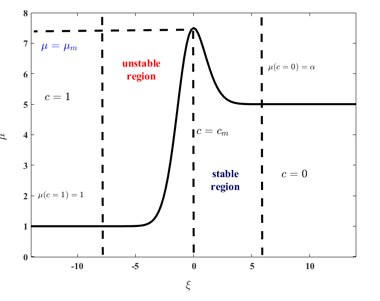
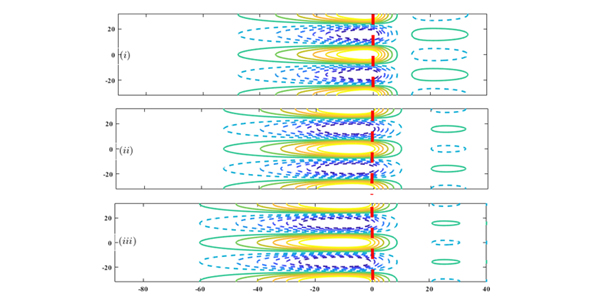
‘The nonmonotonic viscosity profile when a high mobile fluid is displacing a less mobile fluid. There is a potentially unstable region, where the viscosity increases in the flow direction, followed in the downstream direction by a potentially stable region, where the viscosity decreases in the flow direction. The disturbance structure is computed using the singular-value decomposition of the propagator matrix. Reference: Hota & Mishra, Journal of Fluid Mech, Vol. 856, pp:552-579, 2018.’
Dr Tapan is keen on studying other branches of science to provide the correct mathematical approach to address the issues. His project will address one of the hydrodynamic instabilities known as viscous fingering (VF). It forms when a high mobile fluid displaces a low mobile fluid. It has enormous implications in the field of Chemical Engineering Science, Petroleum Engineering, Chromatography, and Oil Extraction process. He explains, “I will study this instability from a mathematician’s point of view, more precisely, to address the mathematical analysis of coupled partial differential equations (PDEs). The system that governs the VF is non-autonomous and there is no readily available stability analysis that can represent Physics, based on robust mathematical analysis. My aim is to connect the dots between mathematics and physics of the VF.”
Infrastructure and laboratory facilities are crucial to conduct research. Upon receiving approval from a prestigious organization like SERB (Science and Engineering Research Board), Govt. of India, Dr. Tapan is entitled to this unique opportunity to serve the scientific community. He divulges, “The award is not only a recognition to me but also to the SRM University, AP. The University will be more visible in the world of research and can attract more eminent scientists and researchers to make the University their second home.” Quoting Master Oogway, ‘Yesterday is history, Tomorrow is a mystery… Today is a gift, that’s why it is called present.’, Dr Tapan is eager to commence working on his project at the earliest, and looks forward to enjoying the process of accomplishing the task.
Continue reading → - Dr Writoban Basu Ball receives an outlay of Rs. 26.34 lakhs from DST, Government of India October 13, 2020
Pursuit of discovering new drug molecules to combat diseases
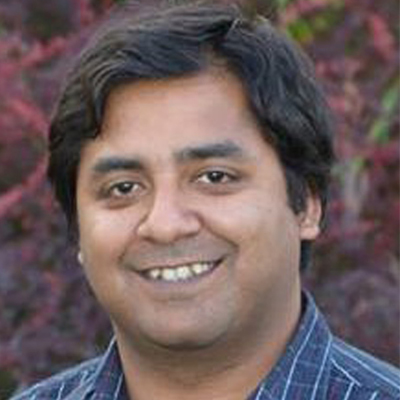
Dr Writoban Basu Ball, Assistant Professor, Department of Biological Sciences, received an outlay of Rs.26.34 lakhs from DBT, Government of India to pursue research on “Targeting Kennedy pathway of cellular phosphatidylethanolamine biosynthesis as a common therapeutic strategy against protozoan parasites like Leishmania donovani, Trypanosoma brucei and Entamoeba histolytica.” Disease-causing intracellular parasites present serious health challenges, which could be fatal if left untreated. For example, Leishmania donovani and Trypanosoma brucei are the causative agents of visceral leishmaniasis and sleeping sickness, respectively. Entamoeba histolytica causes amoebiasis and 100,000 people die each year world-wide from amoebiasis-related complications. The current treatment regimen against these diseases consists of drugs that possess severe toxicity and drug resistance. Toxicity is detrimental to health and drug-resistance causes unresponsiveness of the drug to the parasite, rendering the drug ineffective. Therefore, it has become imperative to discover new drug molecules to combat these diseases.
 In his study, Dr Writoban proposes to repurpose an FDA-approved drug meclizine, which can be used as a potential drug against dreadful parasitic infections. He explains. “One rational way to discover new and effective drugs entails identifying pharmacological targets against unique yet essential parasite metabolic pathways which are either absent or redundant in hosts (in the present case humans). One such central metabolic pathway in L. donovani, T. brucei, and E. histolytica is the Kennedy pathway for the biosynthesis of phosphatidylethanolamine (PE), a major lipid molecule of the cell. Without the presence of this lipid molecule, the cellular membranes (plasma membrane, organellar membranes) cannot form. Therefore, the Kennedy pathway is indispensable to parasite survival. On the contrary, in humans, although the Kennedy pathway is present, other pathway of PE biosynthesis is predominant. Hence, the Kennedy pathway offers a potential target to disrupt PE biosynthesis in these parasites without causing any side effects in the human host. In this context, meclizine, an over the counter anti-nausea drug, has been shown to disrupt the Kennedy pathway.”
In his study, Dr Writoban proposes to repurpose an FDA-approved drug meclizine, which can be used as a potential drug against dreadful parasitic infections. He explains. “One rational way to discover new and effective drugs entails identifying pharmacological targets against unique yet essential parasite metabolic pathways which are either absent or redundant in hosts (in the present case humans). One such central metabolic pathway in L. donovani, T. brucei, and E. histolytica is the Kennedy pathway for the biosynthesis of phosphatidylethanolamine (PE), a major lipid molecule of the cell. Without the presence of this lipid molecule, the cellular membranes (plasma membrane, organellar membranes) cannot form. Therefore, the Kennedy pathway is indispensable to parasite survival. On the contrary, in humans, although the Kennedy pathway is present, other pathway of PE biosynthesis is predominant. Hence, the Kennedy pathway offers a potential target to disrupt PE biosynthesis in these parasites without causing any side effects in the human host. In this context, meclizine, an over the counter anti-nausea drug, has been shown to disrupt the Kennedy pathway.”Dr Writoban’s research is oriented to find safe cures for dreadful parasitic diseases that mostly plagues the underprivileged section of the developing countries like India, and countries of the sub-Saharan Africa. He believes, “The successful implementation of the proposed research scheme would benefit a lot of underprivileged people belonging to the underdeveloped and developing countries, as well as reduce the disease burden of those countries.” Further, Dr Writoban emphasizes, “Getting the grant is only the job half done. I would like to guide this proposal to a fruitful completion so that it can benefit people who need it most. I really want to take this project beyond the bounds of a mere academic exercise.
Continue reading → - Energy-Aware Task Allocation for Multi-Cloud Networks October 2, 2020
Smart algorithm to optimize performance of the heterogeneous multi-cloud network
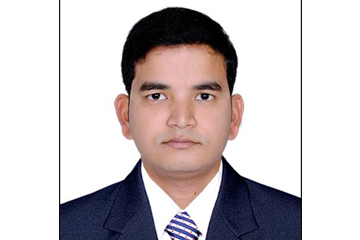 Dr Sambit Kumar Mishra
Dr Sambit Kumar MishraAs the world goes more digital in the future, the dependability on cloud computing is going to be more. The availability of high-capacity networks, low-cost computers and storage devices as well as the widespread adoption of hardware virtualization, service-oriented architecture and autonomic and utility computing has led to growth in cloud computing. But is it enough? How to improve its performance? How to make it more reliable with high-end technology and impeccable performance quality? Dr Sambit Kumar Mishra’s research has an answer to that.
 System Model for Multi-cloud Networks Dr Sambit Kumar Mishra, Assistant Professor, Computer Science and Engineering has published a paper “Energy-Aware Task Allocation for Multi-Cloud Networks” in renowned journal IEEE ACCESS with an Impact Factor: 3.745. The research was done in collaboration with Dr Sonali Mishra, SOA (Deemed to be) University Bhubaneswar, India; Dr Ahmed Alsayat, College of Computer and Information Sciences Jouf University, Al-Jouf, Saudi Arabia; Dr N Z Jhanjhi and Dr Mamoona Humayun, School of Computer Science and Engineering (SCE), Taylor’s University, Malaysia; Dr Ashish Kr. Luhach, The PNG University of Technology, Papua New Guinea Lae, Morobe; Dr Kshira Sagar Sahoo, VNRVJIET, Hyderabad, India.
System Model for Multi-cloud Networks Dr Sambit Kumar Mishra, Assistant Professor, Computer Science and Engineering has published a paper “Energy-Aware Task Allocation for Multi-Cloud Networks” in renowned journal IEEE ACCESS with an Impact Factor: 3.745. The research was done in collaboration with Dr Sonali Mishra, SOA (Deemed to be) University Bhubaneswar, India; Dr Ahmed Alsayat, College of Computer and Information Sciences Jouf University, Al-Jouf, Saudi Arabia; Dr N Z Jhanjhi and Dr Mamoona Humayun, School of Computer Science and Engineering (SCE), Taylor’s University, Malaysia; Dr Ashish Kr. Luhach, The PNG University of Technology, Papua New Guinea Lae, Morobe; Dr Kshira Sagar Sahoo, VNRVJIET, Hyderabad, India.  Example of Direct Acyclic Graph (DAG)with four TasksIn recent years, the growth rate of Cloud computing technology is exponentially, mainly for its extraordinary services with expanding computation power, the possibility of massive storage and all other services with the maintained quality of services (QoS). The task allocation is one of the best solutions to improve different performance parameters in the cloud, but when multiple heterogeneous clouds come into the picture, the allocation problem becomes more challenging. This research work proposed a resource-based task allocation algorithm. The same is implemented and analysed to understand the improved performance of the heterogeneous multi-cloud network. The proposed task allocation algorithm (Energy-aware Task Allocation in Multi-Cloud Networks (ETAMCN)) minimizes the overall energy consumption and also reduces the makespan. The results show that the makespan is approximately overlapped for different tasks and does not show a significant difference. However, the average energy consumption improved through ETAMCN is approximately 14%, 6.3%, and 2.8% in opposed to the random allocation algorithm, Cloud Z-Score Normalization (CZSN) algorithm, and multi-objective scheduling algorithm with Fuzzy resource utilization (FR-MOS), respectively. An observation of the average SLA-violation of ETAMCN for different scenarios is performed.
Example of Direct Acyclic Graph (DAG)with four TasksIn recent years, the growth rate of Cloud computing technology is exponentially, mainly for its extraordinary services with expanding computation power, the possibility of massive storage and all other services with the maintained quality of services (QoS). The task allocation is one of the best solutions to improve different performance parameters in the cloud, but when multiple heterogeneous clouds come into the picture, the allocation problem becomes more challenging. This research work proposed a resource-based task allocation algorithm. The same is implemented and analysed to understand the improved performance of the heterogeneous multi-cloud network. The proposed task allocation algorithm (Energy-aware Task Allocation in Multi-Cloud Networks (ETAMCN)) minimizes the overall energy consumption and also reduces the makespan. The results show that the makespan is approximately overlapped for different tasks and does not show a significant difference. However, the average energy consumption improved through ETAMCN is approximately 14%, 6.3%, and 2.8% in opposed to the random allocation algorithm, Cloud Z-Score Normalization (CZSN) algorithm, and multi-objective scheduling algorithm with Fuzzy resource utilization (FR-MOS), respectively. An observation of the average SLA-violation of ETAMCN for different scenarios is performed. Energy Consumption Vs SLA Violation when
Energy Consumption Vs SLA Violation when
the number of VMs varies and the number of Task is 100.The multi-cloud strategy offers flexibility to service providers. It allows businesses to be productive while using the proper set of services to optimize their opportunities. Adopting a multi-cloud network enables an enterprise to implement a “best of breed” model for the services. Organizations’ ability to choose the vendor that offers the best price for their workload is added significant advantage of multi-cloud. Thus, the optimization of energy consumption in a multi-cloud environment is necessary for the current generation.However, this proposed work has not considered any priority-oriented users, such as task execution through reserve resource in the network, which will be considered as his future work. The future work also aims to propose a task cum resource-aware scheduling approach that will exploit the nature of the presented workload and efficiently map on the available Cloud resources so that energy consumption will optimize.
Link to the research paper: Please Click Here
Continue reading → - Dr Karthik Rajendran’s research highlights different mechanisms of using algae for wastewater treatment September 25, 2020
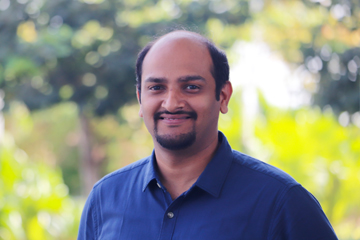
Dr Karthik Rajendran, Department of Environmental Science, SRM University-AP, Andhra Pradesh, has published a paper on “Mechanism and challenges behind algae as a wastewater treatment choice for bioenergy production and beyond” in the Fuel journal, which is published by Elsevier. His research work encompasses wastewater treatment using algae for bioenergy production. In his words, “Conventional wastewater treatment systems use activated sludge processes. This process not only uses energy, but also results in emissions. Wastewater contains valuable nutrients and energy recovery options, which are the least explored. Algae helps in reducing emissions by sequestering carbon which leads to negative emissions. The research highlights different mechanisms of using algae for wastewater treatment.”
India as a country is under water-stress and the need for recycling and reusing water is on the rise. The wastewater contains essential nutrients for agriculture and plant growth which are limited resources available to us. Such limitations have inspired efforts to provide solutions to work on algae as a wastewater treatment method. Processes for the same are studied in this paper to comprehend its efficiency and for developing a sustainable choice for the industry. This work will enable the scientists and industrialists to appreciate the usage of algae as an option for wastewater treatment.
 Dr Karthik further provides insights on his current research proceedings by saying, “We are currently working on recovering nutrients including phosphorus and nitrogen from wastewater. We are currently performing the theoretical evaluation of the amount of nutrients that can be recovered from different nutrient recovery technologies including microalgae. Such systems not only reduce emissions, but also reduce the amount of virgin materials used.”
Dr Karthik further provides insights on his current research proceedings by saying, “We are currently working on recovering nutrients including phosphorus and nitrogen from wastewater. We are currently performing the theoretical evaluation of the amount of nutrients that can be recovered from different nutrient recovery technologies including microalgae. Such systems not only reduce emissions, but also reduce the amount of virgin materials used.”Link to the research paper: Please Click Here
Continue reading →

